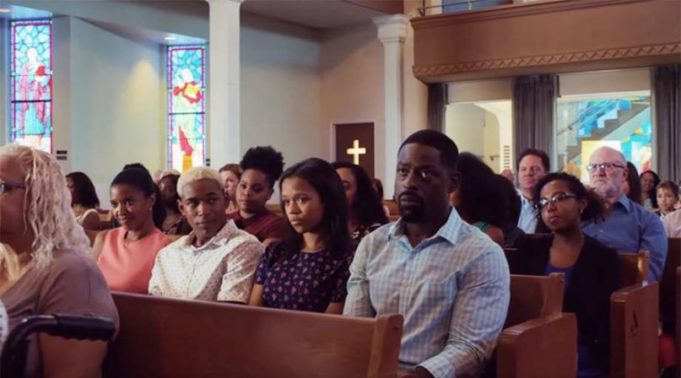This Christmas season is just lousy with good movies that find the depth and breadth of human life in the story of one family. I’ll have more to say about Little Women when it comes out on Christmas, but Trey Edward Shults’ Waves is out in Tarrant County theaters this weekend, and it’s also quite good in a wholly different way.
The film begins with Tyler Williams (Kelvin Harrison Jr.), a Florida high-school student who seems to have everything going for him. He’s a wrestler who’s good enough to have colleges looking at him, receiving additional coaching at home from his father (Sterling K. Brown). His dad also runs the business side of operations for Tyler’s architect stepmother (Renée Elise Goldsberry), providing him with a solid, stable middle-class home. Yet the film gets close enough to see behind the confident facade that this black kid with the bleached-blond hairdo puts up: He already has an Oxy problem from coping with an injured left shoulder, which he’s determined to play through against his doctor’s orders. Also, his girlfriend (Alexa Demie) is late with her period. When an opponent aggravates his bad shoulder during a match, it starts a chain of events that sends Tyler on a downward spiral.
This is the third film by the Austin native Shults, and it’s not at all like the rigorous control of his horror film It Comes at Night. Instead, it has a great deal of the out-of-control quality of his debut film Krisha. Shults aims for sensory overload, so he cranks the music and throws his camera around like he’s trying to hurt his actors with it. In Krisha, he did this to depict a recovering addict experiencing sobriety as an unreal state. Here, he’s doing it to capture the woozy feel of Tyler’s teenage hormones, and the result reminds you of Barry Jenkins’ Moonlight and If Beale Street Could Talk in its rapturous depiction of black life, and the ways in which adolescent emotions can lead to disaster. A horrific act of violence bisects this film, and in the immediate aftermath, Shults splashes the screen with abstract blotches of colored light.
After this, the film switches viewpoints to Tyler’s sister Emily (Taylor Russell), who is rendered a social outcast by the violence, and who strikes up a romance with Luke (Lucas Hedges), an awkward former wrestling teammate of Tyler’s who is the only kid at school who still wants to talk to her. I’ll admit Russell didn’t make any impression on me when I saw her in the lead role of last January’s Escape Room, but now I see why the youngsters are talking about this 25-year-old Vancouverite. She has real screen presence, and her scenes with Hedges have a great, delicate chemistry to them. Harrison (who worked with Shults on It Comes at Night) does fine work here, as does Brown, playing a man who has even less idea than his son about what to do when his son’s athletic career suddenly ends. Yet it’s Russell who sticks with you as you walk away from the theater, as Emily’s inconvenient emotions spill out of her in an elevator, pondering the broken state of her family after watching Luke reconcile with his own drunken, abusive father (Neal Huff) who’s now dying of cancer. Maybe Waves is only soap opera at bottom, but soap opera can be strong when it’s elevated by overwhelming visuals and strong acting, like it is here.
Starring Kelvin Harrison Jr. and Taylor Russell. Written and directed by Trey Edward Shults. Rated R.












